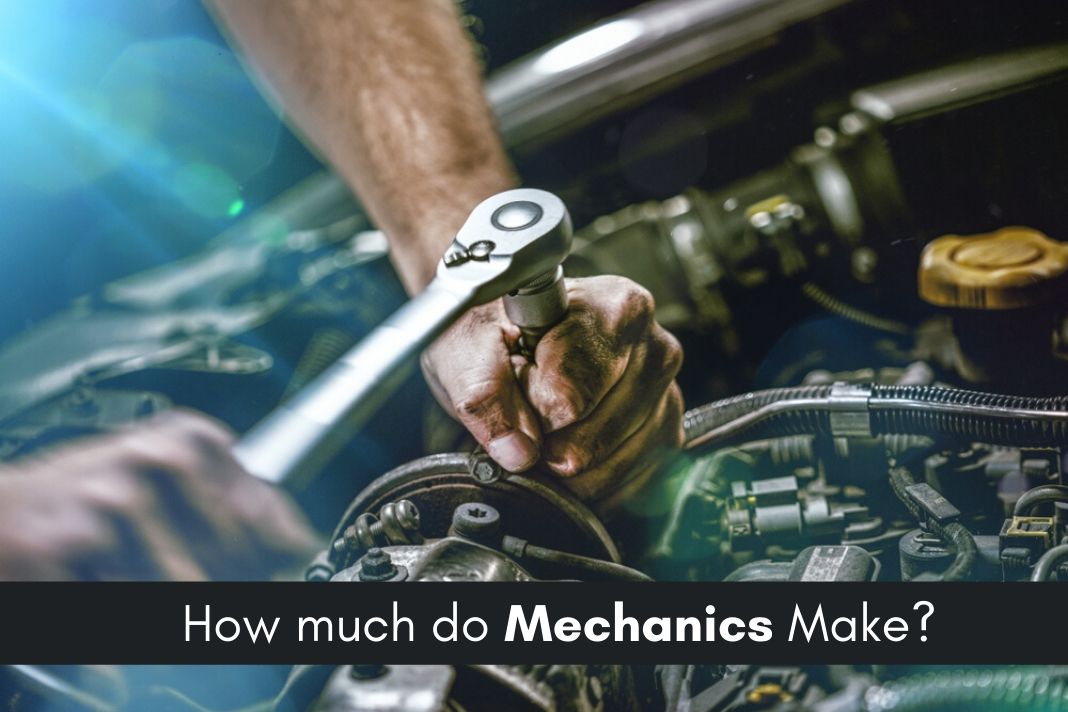
Mechanics perform repair and maintenance on just about any kind of machine you can think of. As such, there are various types of a mechanic, and they tend to make somewhat different levels of pay. Consider the average salary for different classes of a mechanic before you make up which career path you want to choose.
Also, consider how much toil it takes to be there. For instance, a career in small engine repair may require no formal education, while one or two years at a technical school can kick-start a career in automotive mechanics. Meanwhile, well-paid avionics technicians need at least an associate degree before being employed.
How Much Do Mechanics Make
For Automobile Enthusiasts
Automotive mechanics are the most general type of mechanic. They find employment in auto parts shops, car dealerships, and garages. As of 2019, the BLS reports that automotive mechanics earned an average of $20.24 per hour and $42,090 per year.
Mechanics who specialize in the repair of diesel vehicles made a bit more, averaging $21.25 an hour and $44,125 a year. Those who specialize in the repair of motorcycles earn a bit less, making an average of $17.52 an hour and $35,500 per year.
Agricultural and Industrial Mechanical Work
Agricultural mechanics specialize in the repair of vehicles, such as combines, tractors and harvesters and farm machinery. As of 2019, the BLS reports they earned an average of $20.97 an hour and $43,630 per year — slightly less than automotive mechanics.
On the other end, mechanics who work in the industry tend to earn considerably more. Industrial machinery mechanics, who repair manufacturing equipment, averaged $25.41 per hour and $52,860 per year in 2019. Mobile heavy equipment mechanics, who repair mobile construction vehicles such as cranes and bulldozers, earned a comparable average wage of $25.66 an hour and an average salary of $53,370.
Pay for Work and Play
Small engine mechanics fix recreational vehicles such as snowmobiles and all-terrain vehicles, as well as practical vehicles like lawn mowers and snow blowers. They tend to earn less than most types of mechanics, reporting an average wage of $18.19 an hour and an average salary of $37,840 a year to the BLS in 2019. Motorboat mechanics, who fix the engines and electrical systems of small watercraft, made an average hourly wage of $20.89 and an average annual salary of $43,440.
High-Flying Pay for Air Mechanics
Aircraft mechanics tend to be among the most-paid of all kinds of mechanics. They maintain and repair the systems that propel aircraft such as planes and helicopters. As of 2019, the BLS reported that aircraft mechanics earned an average hourly wage of $30.92 and an average annual salary of $64,310. Mechanics who specialize in the maintenance repair of navigation and radar systems, called avionics mechanics, reported comparable average pay of $27.38 an hour and $56,940 per year.
[ Read: How to Become a Freelance Mechanic ]
Careers in Europe:
Average Automotive Service Technician / Mechanic
An early career Automotive Service Technician / Mechanic with 1-5 years of experience (1) earns an average total compensation (includes bonus, tips, and overtime pay) of €10.50. A mid-career Automotive Service Technician / Mechanic with 5-10 years of experience earns an average total compensation of €14.00. An experienced Automotive Service Technician / Mechanic with 10-20 years of experience earns an average total compensation of €17.00.
Careers in Asia:
An entry-level mechanic (1-5 years of experience) earns an average salary of ¥3,624,646. On the other hand, a senior level mechanic (8+ years of experience) earns an average salary of ¥6,016,010.
The average mechanic salary in Japan is ¥4,935,307 or an equivalent hourly rate of ¥2,373. In addition, they make an average bonus of ¥163,852.
Career Requirements
Training
Prospective mechanics may look to junior colleges and vocational schools to receive training in the specific field of repair they wish to pursue. These institutions offer certificate, diploma and associate degree programs in automotive technology and diesel repair to help aspiring mechanics gain the knowledge they need to enter the field. While intermediate and advanced courses differ by industry, most programs begin with introductory courses in blueprint reading, electronic circuits and control systems.
Mechanics may also learn the necessary skills through on-the-job training or apprenticeships under the supervision of more experienced technicians. Mechanics-in-training often begins by performing routine work, like greasing parts, changing filters or replacing batteries.
[ Read: How to be a Freelance Mechanical Engineer ]
Certification
Mechanics who have the required skills, education and experience may consider earning voluntary certifications, like those offered by the National Institute for Automotive Service Excellence. Certifications may help mechanics increase their employment opportunities and pay rates. Mechanics who work on aircraft may be required to seek FAA airframe and powerplant mechanics certifications.
While mechanics’ salaries differ based on the type of repair they perform, their earnings can be increased by additional schooling, experience and optional professional certification. While important, earnings are just one of the factors you should consider when deciding on a career path.




